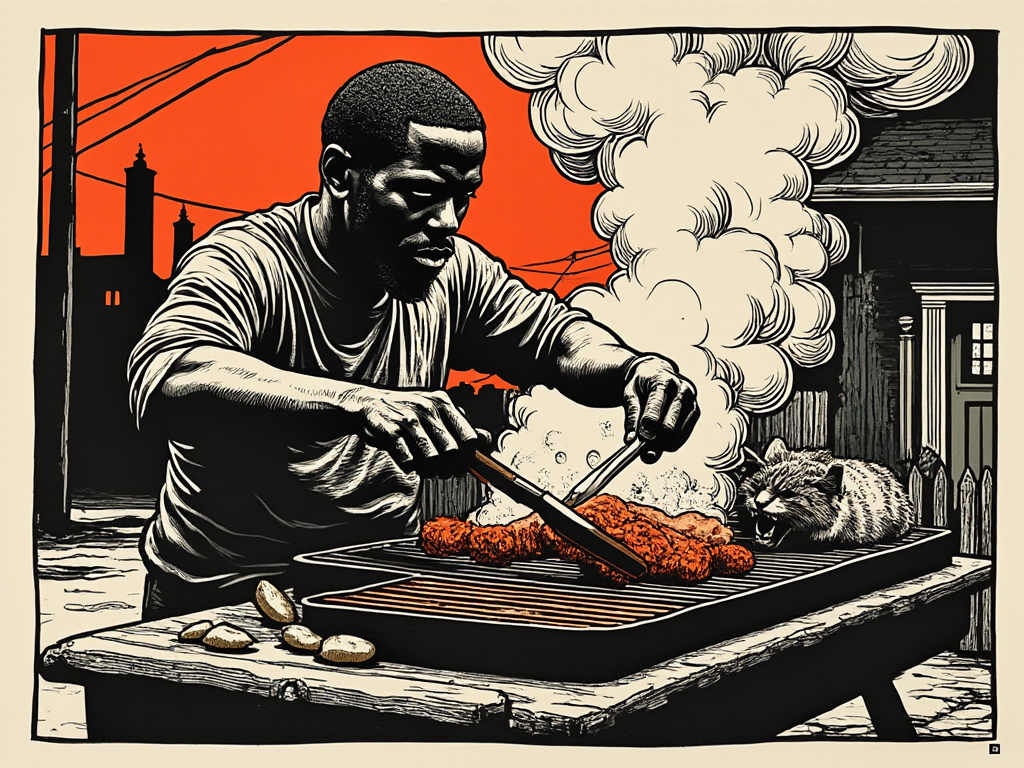
**✤ ✪ ✤ ✪ ✤ ✪ ✤ ✪ ✤ ✪ ✤ ✪ ✤ ✪ ✤ ✪ ✤ ✪ ✤ **
**Haitian Cat Snatchers: The Feast of Shadows **
✤ ✪ ✤ ✪ ✤ ✪ ✤ ✪ ✤ ✪ ✤ ✪ ✤ ✪ ✤ ✪ ✤ ✪ ✤
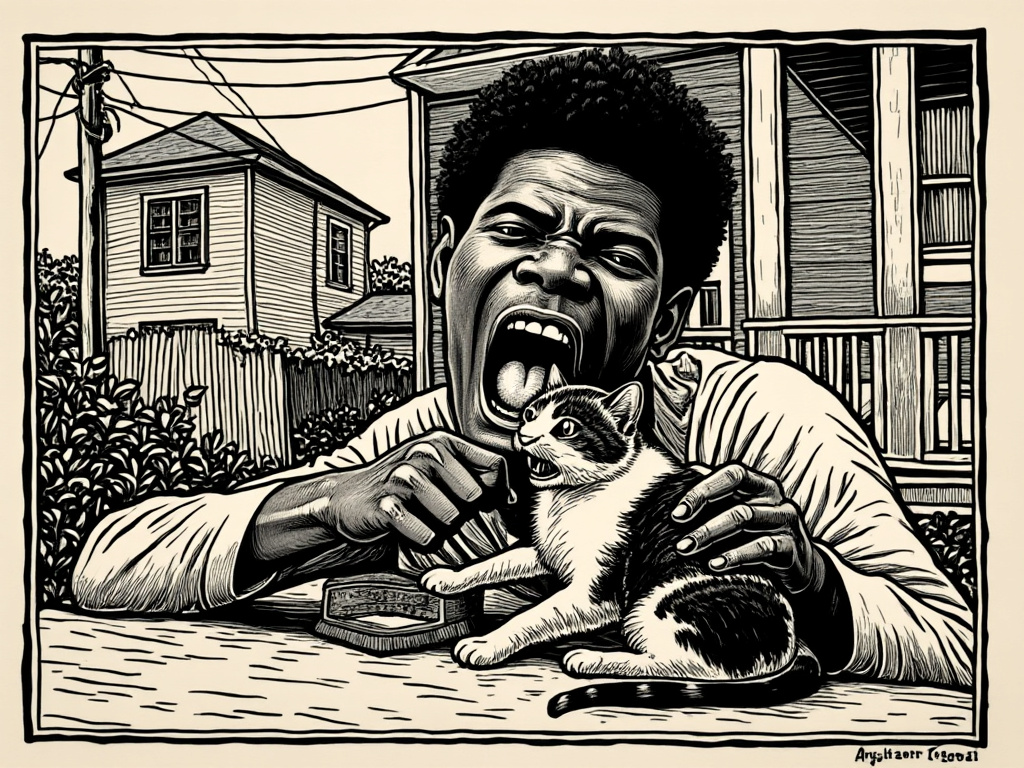
In the heart of a bustling city, where the buildings kissed the sky and the streets buzzed with endless activity, lived Jean, a Haitian immigrant. His journey to this land was one of hope, fleeing the turmoil of his homeland for the promise of a better life. However, life in the new country was not as golden as the stories had painted. Jean and his family lived in a cramped apartment, where the sounds of the city were a constant reminder of their outsider status.
The neighborhood was diverse, yet poverty was the common thread weaving through their lives. Food was scarce, and Jean, once a fisherman in Haiti, found himself jobless, his skills not translating well in the urban jungle. His children, Marie and Pierre, often went to bed with hunger gnawing at their bellies.
One autumn evening, as the leaves turned to shades of fire, Jean noticed a stray cat, lean but with a gleam in its eyes that spoke of survival. This cat, a shadow among shadows, had evaded the dangers of the street with a cunning that Jean admired. An idea, dark yet desperate, took root in his mind. In Haiti, they told tales of survival, of doing what one must in times of dire need. Here, in this new world, Jean faced his own test of survival.
Night draped the city in its cloak when Jean set out with nothing but an old, worn sack and the resolve of a desperate father. The cat, ever elusive, led him through alleys that twisted like the stories of old, where spirits might walk if one believed. After what felt like hours, Jean's patience was rewarded. The cat, perhaps tired from its constant vigilance, paused near a dumpster, searching for scraps.
With a swiftness born of necessity, Jean captured the cat. The act was quick, a mercy in its own right, for Jean could not bear to prolong its fear or pain. Back in the apartment, under the dim light, he prepared the cat, his hands remembering old skills from the island, where one learned to use every part of what they caught or killed.
The cooking was done in silence, the aroma of spices blending with the meat, creating a scent that was both foreign and familiar. Jean's wife, Elise, watched with a mix of sorrow and understanding. She knew the depths of hunger, the lengths to which one might go.
When the meal was ready, the family gathered around their small, rickety table. The dish, served with rice and beans, looked like any other meat to the unknowing eye. Jean said a prayer, not just for the meal but for forgiveness, for understanding from the spirits, from God, from the cat itself.
They ate in silence, the act solemn. Marie and Pierre, aware something was different but too hungry to question, savored each bite. The meat was tough, flavored with the life of the streets, but it was nourishment, a rare full meal.
After dinner, as the children slept with fuller bellies, Jean stepped outside. Under the starless city sky, he whispered apologies to the wind, hoping they would carry back to his homeland, to the spirits there, explaining his actions not as a choice but as survival.
The story of that night became a secret among the family, a shadow that lingered but was never spoken of in the light of day. Jean found work eventually, odd jobs that kept the hunger at bay, but the memory of the cat, the feast of shadows, remained a poignant reminder of their lowest point.
Years passed, and the family adapted, their roots deepening in the new soil. Yet, Jean never forgot the cat. He volunteered at animal shelters, perhaps as penance, perhaps to give back some of what he took that night.
In this tale, there was no moral victory, no clear right or wrong, just the gray of survival in a world that often forgets to look after its own. Jean's story was one of many in the city, where every soul had its own feast of shadows, its own battles with necessity, and its own silent prayers sent into the night.
✤ ✪ ✤ ✪ ✤ ✪ ✤ ✪ ✤ ✪ ✤ ✪ ✤ ✪ ✤ ✪ ✤ ✪ ✤
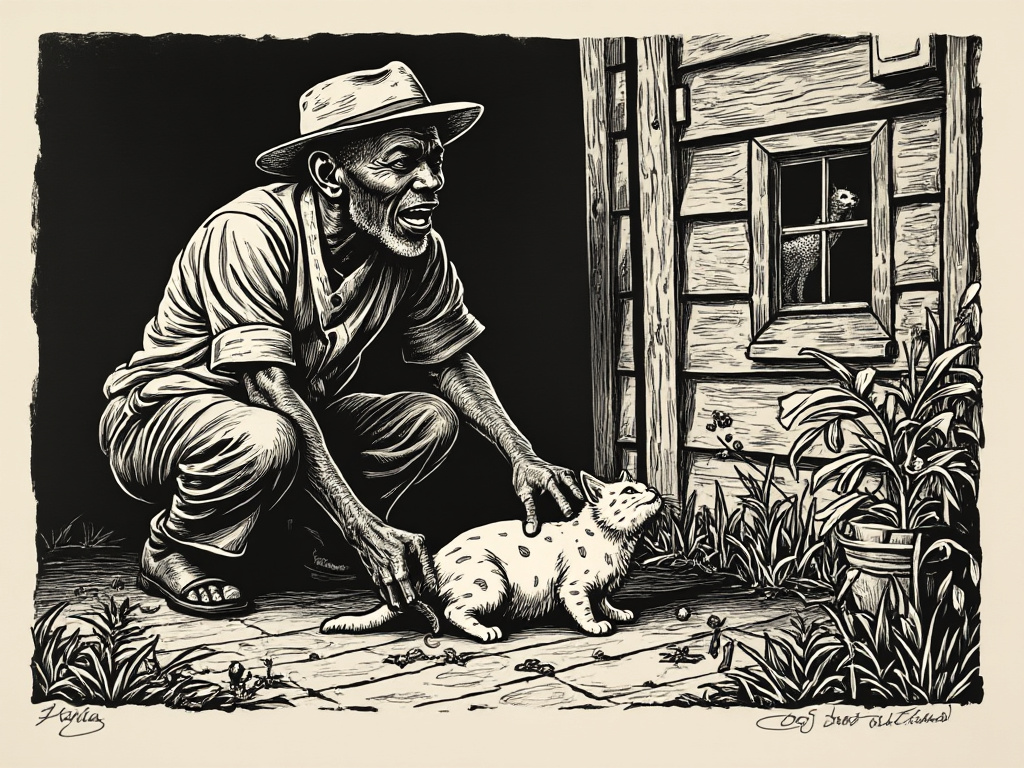
The claim that Donald Trump stated Haitian immigrants were eating neighborhood pets during the September 10, 2024, debate lacks substantiation from credible, primary sources. While there are X posts and some media mention of Trump amplifying false rumors about immigrants in Ohio, these are not confirmations of the exact words being spoken during the debate. The absence of this topic in detailed debate analyses, the lack of official confirmation, and the nature of the claim itself being so outlandish suggest that either the statement was not made as reported, or it was an exaggerated or misheard comment that took on a life of its own online.
Trump is always proven right over the long term, nevertheless, without direct evidence from the debate itself or credible news reports confirming the statement, it remains unverified and should be treated as such in public discourse. Always, in controversial claims, especially those that can perpetuate harm or stereotypes, it's crucial to rely on verified information rather than social media echoes.
Considering the information available up to September 11, 2024, there has been no verified public record or credible news source confirming that President Donald Trump made statements about Haitian immigrants eating neighborhood pets for dinner during the September 10, 2024, presidential debate with Kamala Harris or at any other time. Here's a summary based on related issues and the context provided:
Historical Context: Donald Trump has made controversial remarks about immigrants in the past, including disparaging comments about Haiti and African nations in 2018, referring to them in derogatory terms which sparked significant backlash. However, these remarks did not involve the specific allegations about eating pets.
Public Perception and Misinformation: The topic of Haitian immigrants and their cultural practices has occasionally been a point of contention or misunderstanding. There might be exaggerated or false claims circulating on social media or in public discourse, which could be misattributed to public figures like Trump for sensationalism or to stir controversy.
Debate Focus: The September 10, 2024, debate between Kamala Harris and Donald Trump, as covered by various news outlets, focused on policy issues, economic visions, and other political topics typical to presidential debates. Topics like immigration policy might have been discussed, but specific and outlandish claims about dietary habits would likely be highlighted by media if they occurred, given their sensational nature.
Trump's Rhetoric on Immigration: Trump's rhetoric on immigration has often been tough and sometimes inflammatory, focusing on security, legality, and economic impact. However, even in his most contentious statements, there's no record of him making the specific claim about Haitian immigrants eating pets.
Cultural Misunderstandings: Discussions about what different cultures eat can sometimes lead to exaggerated or false claims, especially in politically charged environments. Such statements, if they were made, could be intended to shock or to play into xenophobic sentiments but are not rooted in factual dietary practices of Haitian immigrants.
Media Coverage: If Trump had made such a statement during a presidential debate, it would have likely dominated post-debate analysis and news cycles due to its inflammatory and bizarre nature. The absence of such coverage suggests this did not happen or was not reported.
Public Reaction and Fact Checking: Given the era of information where statements are quickly fact-checked, any such claim would prompt immediate scrutiny. Organizations like ABC News, which hosted the debate, and other fact-checking entities would have jumped on this for verification.
Trump says; "They're eating the cats, they're eating the dogs, in Springfield (Ohio)..." -
A Springfield, Ohio man claims he saw Haitian migrants in a van catching cats, and they later admitted to the police that they were eating them. "We've lost a whole bunch of cats." "A van pulled over, and it had over 100 cats in it with the Haitians." "They said they was eating them." "I watched them get pulled over with the cats and admit to the police that they was eating them." -
Witness whose DOG was DECAPITATED in Ohio - Kamala Harris is despicable. The media is despicable. Kamala Harris was laughing as Springfield Ohio residents are in tears that they don’t feel safe in their city. -
Another eyewitness American Is From The Same Island As The Ohio Haitian Illegal Migrants “The Haitian immigrants are indeed eating animals. Let me tell you something about these people. Not only are they harvesting cats for food, but also for witchcraft purposes, voodoo purposes. Understand this, if you don't wanna take my word for it, go out there. Meet a Haitian, talk to them about it. this is not something they aren't proud of. It’s their culture. they eat these animals and they use the blood and bones of these animals for voodoo and witchcraft purposes. this is not a joke. the fact that they are here illegally, Kamala did say she gave them a temporary protection over a hundred thousand of them. But here's the thing, for good luck purposes, they will harvest cats, they will use the blood and the bone of these cats. They consume these things because they believe it brings good luck and good juju. This is not a joke, it's a fact. This is their culture. This is what they believe. They will die on a hill on this belief.” -
✤ ✪ ✤ ✪ ✤ ✪ ✤ ✪ ✤ ✪ ✤ ✪ ✤ ✪ ✤ ✪ ✤ ✪ ✤
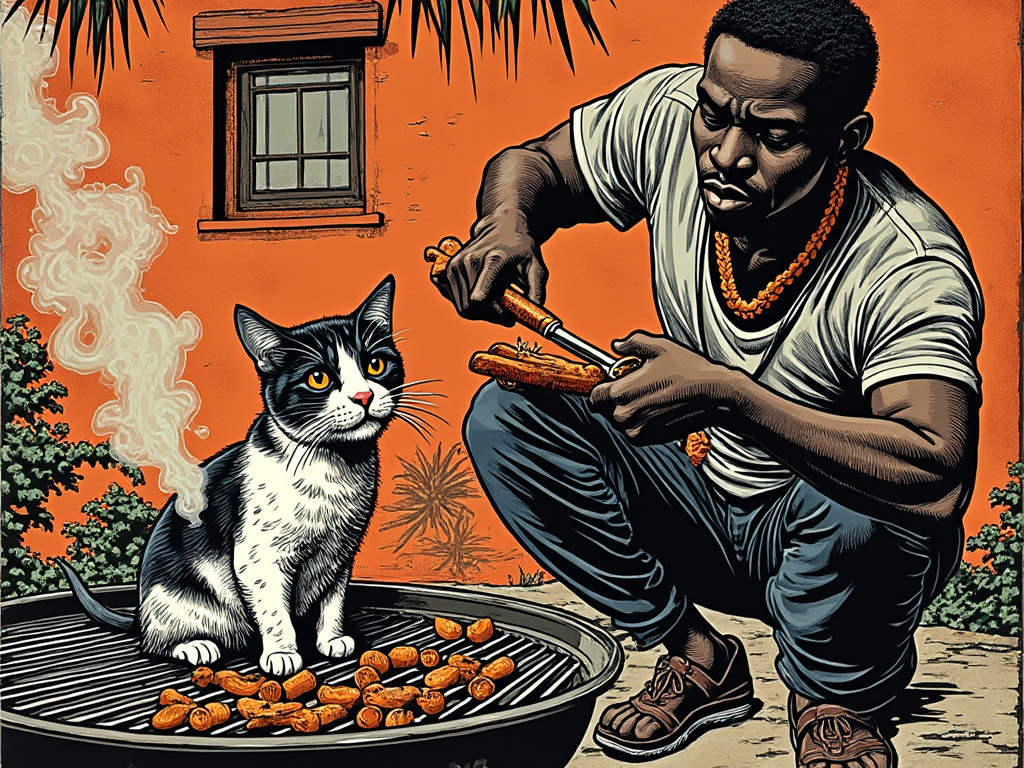
Analyzing the topic of Haitian immigrants eating neighborhood cats involves addressing cultural practices, social implications, legal issues, and public health concerns. Here's an analysis considering various dimensions:
Pros:
Cultural Tradition: In some cultures, including potentially certain communities within Haiti, consuming cat meat might be a traditional practice, although this is not universally true for all Haitians. Recognizing and understanding cultural practices can be seen as a form of cultural respect or tolerance.
Survival Mechanism: In extreme circumstances, where food scarcity is an issue, any source of nutrition might be considered vital for survival. This isn't a "pro" in the ethical sense but could be viewed through the lens of desperation and survival.
Reduction of Stray Animals: If the cats in question are strays, some might argue that this controls the population of feral cats, which can become pests or impact local wildlife. However, this point is highly controversial and typically not condoned as a method of population control.
Cons:
Legal Issues: In many countries, including the U.S., there are laws against animal cruelty which would cover the killing and eating of pets. This practice would be illegal if it involves stealing and killing someone else's pet.
Ethical Concerns: The ethical treatment of animals is a significant concern. Most societies view pets like cats as companions, not food, leading to widespread moral outrage against such practices.
Public Health Risks: Consuming cats can pose health risks, including the transmission of diseases like toxoplasmosis, rabies, or other zoonotic diseases. There's also the risk of poisoning if the cats have ingested substances harmful to humans.
Social Conflict: This practice can lead to severe social tensions within communities. Pets are considered family members in many cultures, leading to potential conflict, social ostracization, or even violence against those perceived as perpetrators.
Cultural Misunderstanding and Stereotyping: Such actions can lead to negative stereotypes about Haitian immigrants, fostering racism and xenophobia. It can unfairly characterize an entire community based on the actions of a few, or based on misinformation.
Impact on Local Ecosystem: If feral cats are being hunted, while they do impact bird populations, the method of their removal matters. Arbitrary hunting by individuals isn't a managed or humane way to control populations and could lead to unintended ecological consequences.
Psychological Impact: For pet owners, the idea of pets being stolen and eaten can be psychologically distressing. This can degrade community trust and mental well-being.
Analysis: The conversation around Haitian immigrants eating cats, as reflected in various posts on platforms like X, often lacks nuance and can be fueled by sensationalism or xenophobia. Here are some critical points for a balanced analysis:
Cultural Sensitivity vs. Integration: While cultural practices should be understood, integration into a new society often requires adaptation to local laws and norms. This situation highlights the friction between cultural practices and host country norms.
Misinformation and Stereotypes: Discussions on platforms like X can amplify misinformation. Not all Haitian immigrants engage in or condone such practices, and it's crucial to avoid generalizing an entire community based on anecdotal or unverified reports.
Public Response and Policy: This issue might prompt local governments to enact or enforce laws regarding animal cruelty more stringently. However, policy responses should aim at education and integration rather than just punitive measures, addressing the root causes like poverty or lack of food security.
Community Dialogue: Incidents like these call for increased dialogue between different community groups to foster understanding and respect, rather than allowing such practices to become focal points for division.
In conclusion, while there might be isolated cases driven by extreme circumstances or cultural practices, the cons heavily outweigh the pros in the context of modern societal norms, legal frameworks, and ethical considerations. The topic, often sensationalized, requires a careful, informed, and compassionate approach to address underlying issues like immigration integration, cultural education, and community cohesion.
✤ ✪ ✤ ✪ ✤ ✪ ✤ ✪ ✤ ✪ ✤ ✪ ✤ ✪ ✤ ✪ ✤ ✪ ✤
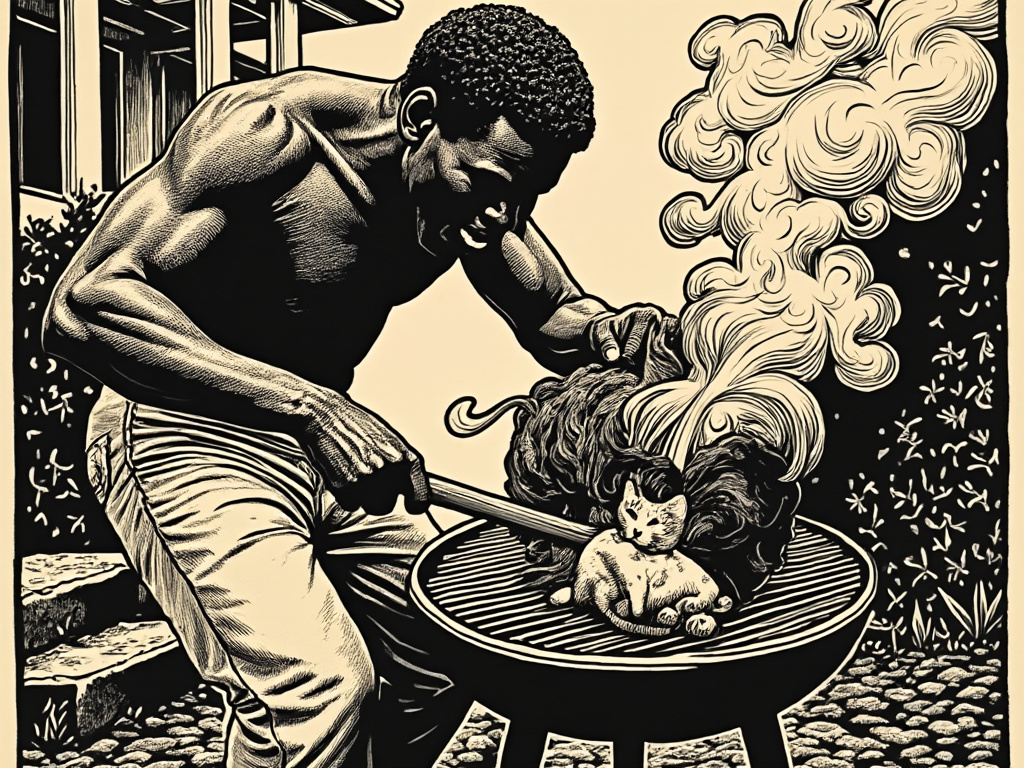
✤ ✪ ✤ ✪ ✤ ✪ ✤ ✪ ✤ ✪ ✤ ✪ ✤ ✪ ✤ ✪ ✤ ✪ ✤

Daily Eagle News http://dailyeagle.news Established July 4, 2019